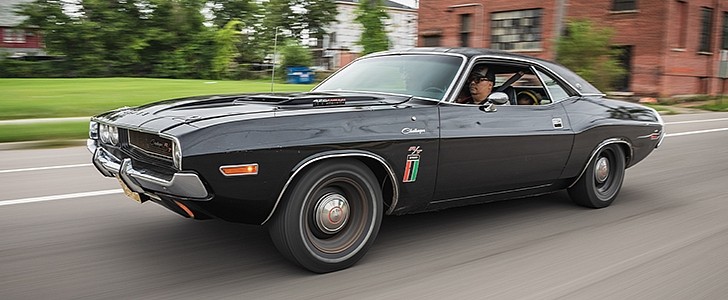The Historic Vehicle Association (HVA) has unveiled its latest inductees into the Historic Vehicle Registry, which aims to preserve and celebrate America’s automotive culture. One of them, inductee number 28, is a 1970 Dodge Challenger once known as Detroit’s Black Ghost.
Black Ghost was a legend on the illegal street racing scene back in the ‘70s, the HVA says. The 1970 Dodge Challenger R/T SE was purchased in 1969 by Godfrey Qualls, who was a U.S. army vet decorated with the Purple Heart and, most surprising of all, a Detroit Police motorcycle patrol officer. Officer by day, street racer (occasionally) by night – a secret not even his son was aware of until 2015, when Qualls senior passed away.
According to the HVA, Godfrey Qualls bought the Challenger specifically for racing and checked every box in terms of options. The final tally was $5,272, including $17 delivery charge, and included pistol grip shifter for the four-speed manual transmission, 26 HEMI 4-barrel V8 under the hood, “gator grain” black vinyl top, houndstooth upholstery and so much more.
Every few months, Qualls would take his Challenger out and hit the streets. He would show up “out of the blue” at street races, win them and then go off the radar for another couple of months. Because of this, no one knew who the car belonged to and it soon gained urban legend status: they called it Black Ghost.
Towards the end of the ‘70s, Qualls had had enough of racing and put the Challenger in a garage, where his son Gregory would discover it in 2015, after his death. As Gregory tried to bring it back to proper running order, he found out about his father’s racing past – something he tells the Detroit Free Press he never had an inkling of. Gregory never restored the car, performing only light maintenance work on it, so, with all its 45,000 miles (72,420 km) on the clock, it remains a unique and very important time capsule.
“The ultra-low mileage, untouched survivors are important time capsules demonstrating how the cars left the factory, but this Challenger symbolizes the lives the cars lived and the stories of the people that drove them,” HVA says of inductee number 28. “Qualls’ car was used, abused and then frozen in time right when the golden era of muscle and pony cars came to a close.”
According to the HVA, Godfrey Qualls bought the Challenger specifically for racing and checked every box in terms of options. The final tally was $5,272, including $17 delivery charge, and included pistol grip shifter for the four-speed manual transmission, 26 HEMI 4-barrel V8 under the hood, “gator grain” black vinyl top, houndstooth upholstery and so much more.
Every few months, Qualls would take his Challenger out and hit the streets. He would show up “out of the blue” at street races, win them and then go off the radar for another couple of months. Because of this, no one knew who the car belonged to and it soon gained urban legend status: they called it Black Ghost.
Towards the end of the ‘70s, Qualls had had enough of racing and put the Challenger in a garage, where his son Gregory would discover it in 2015, after his death. As Gregory tried to bring it back to proper running order, he found out about his father’s racing past – something he tells the Detroit Free Press he never had an inkling of. Gregory never restored the car, performing only light maintenance work on it, so, with all its 45,000 miles (72,420 km) on the clock, it remains a unique and very important time capsule.
“The ultra-low mileage, untouched survivors are important time capsules demonstrating how the cars left the factory, but this Challenger symbolizes the lives the cars lived and the stories of the people that drove them,” HVA says of inductee number 28. “Qualls’ car was used, abused and then frozen in time right when the golden era of muscle and pony cars came to a close.”










